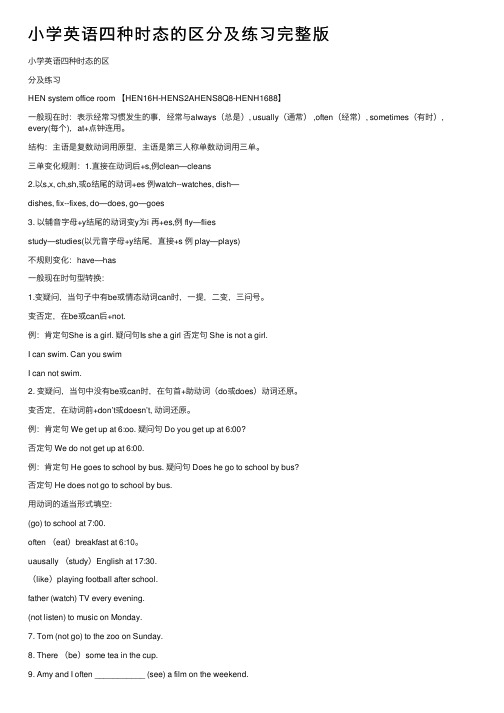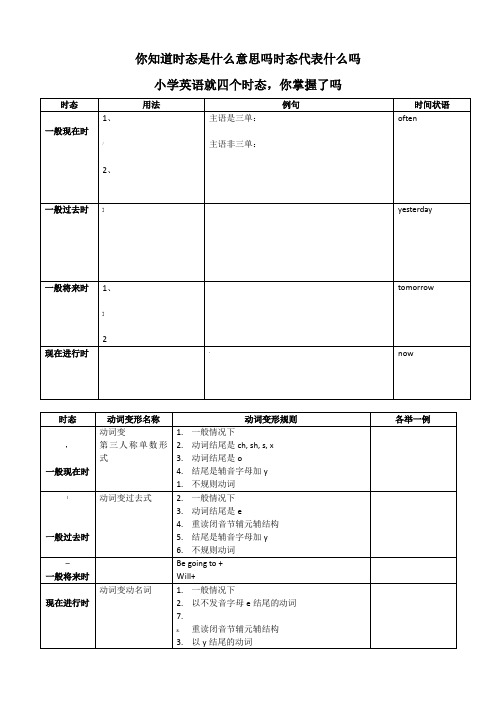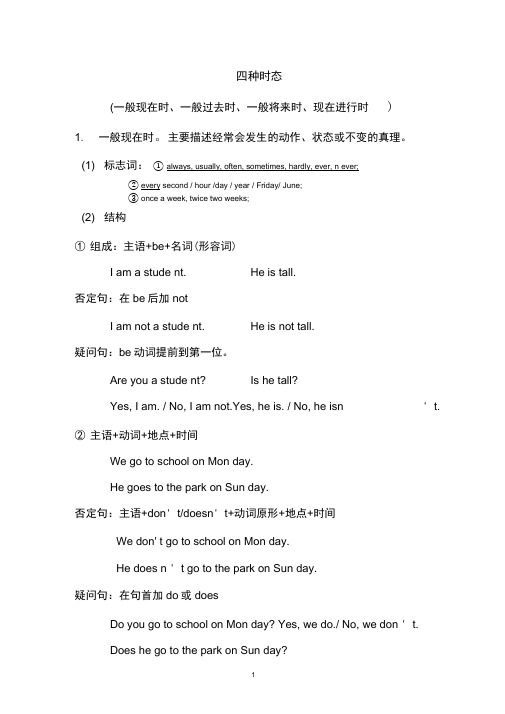(完整版)小学英语四种时态知识点加练习
小学英语时态总结及练习题终版【精】

四大时态总结及练习你知道时态是什么意思吗?时态代表什么吗?小学英语就四个时态,你掌握了吗?时态用法例句时间状语一般现在时1、表示事物或人物的特征、状态。
2、表示经常性或习惯性的动作。
3.表示客观现实。
主语是三单:Theskyisblue.Hegetsupatsixeveryday.主语非三单:Theballoonsareblue.Igetupatsixeveryday.often一般过去时表示过去某个时间发生的动作或存在的状态。
Wereyouatschooljustnow?WhatdidJimdoyesterday?yesterday一般将来时1、表示将要发生的动作或存在的状态。
2及打算、计划或准备做某事。
Iwillgotoschooltomorrow.I’mgoingtohaveapicnicthisafternoon.tomorrow现在进行时现在进行时表示现在正在进行或发生的动作。
Areyousleeping?Whatareyoudoing?now时态动词变形名称动词变形规则各举一例一般现在时主语为第三人称单数时,动词变三单1. 一般情况下2. sh,ch,s,x,o结尾3. 结尾是辅音字母加y4.不规则动词havecookwashdostudy一般过去时动词变过去式 1. 一般情况下2. 动词结尾是e3. 重读闭音节辅元辅结构4. 结尾是辅音字母加y5. 不规则动词pulltastestopstudybe,see,get等等一般将来时begoingto+ will+现在进行时动词变动名词 1. 一般情况下2. 以不发音字母e结尾的动词3.重读闭音节辅元辅结构cookmakerun,swim英语语法中的时态(tense)是一种动词形式,不同的时态用以表示不同的时间与方式。
是表示行为、动作、状态在各种时间条件下的动词形式多加练习,百战不殆之时态一、选择最佳的答案:1.____Aliceoftenplaythepiano?No,she_____.A.Do;doB.Does;doesC.Does;doesn't2.___yourpenpal__inBeijing?A.Do;liveB.Do;livesC.Does;live3.TomandMike__veryexcited,theywilltakeatrip.A.isB.areC.am4.Ilike________verymuch.Whataboutyou?A.danceB.dancedC.dancing5.Thekite____abird.A.looklikeB.islookingC.lookslike6.BillandI___goodfriends.A.isB.areC.am7.Sandyoften___hishomeworkonSundays.A.doB.doesC.did8.Whatdoyouusuallydoontheweekend?I__________.A.wentswimmingB.goswimmingC.visitedgrandparents9.Whatdoyouusuallydoonyourholiday?Iusually__________.A.sawelephantsB.singanddanceC.tookpicture10.I____astudent.Igotoschool____buseveryday.A.is;byB.am;onC.am;by11.I____abrother.She____asister.A.have;hasB.has;hasC.have;have12.You____astudent.He____ateacher.A.is;isB.are;isC.are;are13.Healways_____footballgames.A.watchesB.watchC.doesn't14.Mybestfriend_____shells.A.collectsB.collectC.often15.Shedoesn’t_____listeningtothemusic.A.oftenB.likeC.likes16.MymotherandI___alwayswatchromanticfilms.A.doesn’tB.don’tC.do17.---When_____heusuallygethomeonFriday?----HeusuallygetshomeatfouronFriday.A.doB.doesC.did18,.Summer_________spring.esafteresinesbefore19.Everyone____totheirteacherintheclassroom.A.arelisteningB.islisteningC.listen20.Theyaresingingand___togetheratthepartynow.A.danceB.dancedC.dancing21.Listen!Thebirds____.A.issingingB.aresingC.aresinging22.Look!Thekite___inthesky.A.flyB.fliesC.isflying23.They____ridingaforse.A.isB.areC.am24.Kate____playingchess.A.amB.isC.are25.Areyouwashingclothes?A.Yes,youareB.Yes,IamC.No,Iam26.Ishe____TV?Yes,heis.A.watchB.watchingC.not27.____theytakingpictures.?Yes,theyare.A.AmB.BeC.Are28.It’s10o’clock.Ben_____TVinthebedroom.A.watchB.iswatchingC.watches29.I___presentsformyparentsyesterday.A.buyedB.boughtC.buying30.Susan_____swimmingyesterday.A.goB.goesC.went31.Danny_____breakfastfivetimeslastweek.A.eatB.ateC.eatedstSunday____TreePlantingDay.A.isB.wereC.was33.I____alotfromourtextbook.A.learnedB.learnesC.learning34.We____tothezooand___alotofanimalsyesterday.A.go;seeB.went;sawC.goes;sees35.Whatdidyoudolastweekend?--I_________A.readabookB.washtheclothesC.gofishing36.Whatdidyoudoonyourholiday?I________A.boughtapresentB.goskiingC.learnEnglish37.Whatdidhe_____yesterday?He____hishomework.A.did;didB.do;didC.do;do38.YesterdaymypresentsandI____ourhouse.A.werecleaningB.cleanedC.aregoingtoclean39.What_____totreesinthedifferentseasons?A.happenB.happensC.happenedstsummer.I____inthelakeandplayedonthebeach.A.swimB.swamC.willswim41.DidyoueatgoodfoodinChina?______.A.Yes,IdoB.No,Ididn’tC.No,Idid42.Weplayedbasketball_____.A.sometimesB.onSaturdaysstSaturday43.I’mgoingto___somechopsticks___Sundayafternoon.A.bought;onB.buy;onC.buy;on44.WhenareyougoingtoHongKong?I’mgoingthere____.A.thisweekendB.byplaneC.yesterday45.I’mgoingto____myfriendsthisweekend.A.visitB.visitedC.visiting46.I’mgoingto____homeworktomorrow.A.doesB.doC.did47.Areyougoingtotakeapianoclass?____A.No,wenotB.No,IamC.Yes,Iam48.Iam___eatbreakfastat7:15.A.willB.goingtoC.shall49.Wearegoingto____totheparktomorrow.A.goB.goesC.going50.Whatfilmareyougoingto______?A.seeB.watchC.look51.We_____aplaytomorrow.Willyoupleasejoinus?A.aregoingtoseeB.sawC.sees52.He___aracewithMingMing.A.shallhaveB.willhaveC.goingtohave53.Where_____yougotomorrow?A.areB.willC.shall54.___hisbrothergoingtoclimbmountains?A.IsB.AreC.Am55.Look!It_____.A.willsnowingB.isgoingtosnowC.snows56.I____freethisafternoon.A.beB.willbeC.goingtobe57.Theywill____roastducksinBeijing.A.ateB.eatsC.eat58.I__visitmyfriendsthisweekend.A.gotoB.amgoingtoC.goingto二、按照要求改写句子1.DanielwatchesTVeveryevening.(改为否定句)___________________________________________________2.Idomyhomeworkeveryday.(改为一般疑问句,作否定回答)________________________________________________________ 3.Shelikesmilk.(改为一般疑问句,作肯定回答)___________________________4.Amylikesplayingcomputergames.(改为一般疑问句,作否定回答)___________________________________________________5.Iliketakingphotosinthepark.(对划线部分提问)________________________________________________________ 6.JohncomesfromCanada.(对划线部分提问)___________________________________________________7.Nancyisgoingtogocamping.(改否定)??Nancy________goingtogocamping.1.I’llgoandjointhem.(改否定)??I_______go______jointhem.2.I’mgoingtogetupat6:30tomorrow.(改一般疑问句)??_______________________togetupat6:30tomorrow?3.Wewillmeetatthebusstopat10:30.(改一般疑问句)??_______________meetatthebusstopat10:30.4.Sheisgoingtolistentomusicafterschool.(对划线部分提问)??_______________she_________________________afterschool?5.Myfatherandmotheraregoingtoseeaplaythedayaftertomorrow.(同上) ??__________________goingtoseeaplaythedayaftertomorrow.1.Therewasacarinfrontofthehousejustnow.否定句:________________________________________________ 一般疑问句:____________________________________________ 肯、否定回答:__________________________________________ 肯、否定回答:__________________________________________一.按要求改写句子2.Theboyisplayingbasketball.否定句:____________________________一般疑问句:_________________________肯定回答:__________________________否定回答:__________________________对“isplayingbasketball”提问:__________________________对“Theboy”提问:__________________________3.Theyaresingingintheclassroom.否定句:____________________________一般疑问句:_________________________肯定回答:__________________________否定回答:__________________________对“aresinging”提问:__________________________对“intheclassroom”提问:__________________________三、用括号内动词的适当形式填空。
小学英语四种时态的区分及练习完整版

⼩学英语四种时态的区分及练习完整版⼩学英语四种时态的区分及练习HEN system office room 【HEN16H-HENS2AHENS8Q8-HENH1688】⼀般现在时:表⽰经常习惯发⽣的事,经常与always(总是), usually(通常) ,often(经常), sometimes(有时), every(每个),at+点钟连⽤。
结构:主语是复数动词⽤原型,主语是第三⼈称单数动词⽤三单。
三单变化规则:1.直接在动词后+s,例clean—cleans2.以s,x, ch,sh,或o结尾的动词+es 例watch--watches, dish—dishes, fix--fixes, do—does, go—goes3. 以辅⾳字母+y结尾的动词变y为i 再+es,例 fly—fliesstudy—studies(以元⾳字母+y结尾,直接+s 例 play—plays)不规则变化:have—has⼀般现在时句型转换:1.变疑问,当句⼦中有be或情态动词can时,⼀提,⼆变,三问号。
变否定,在be或can后+not.例:肯定句She is a girl. 疑问句Is she a girl 否定句 She is not a girl.I can swim. Can you swimI can not swim.2. 变疑问,当句中没有be或can时,在句⾸+助动词(do或does)动词还原。
变否定,在动词前+don’t或doesn’t, 动词还原。
例:肯定句 We get up at 6:oo. 疑问句 Do you get up at 6:00?否定句 We do not get up at 6:00.例:肯定句 He goes to school by bus. 疑问句 Does he go to school by bus?否定句 He does not go to school by bus.⽤动词的适当形式填空:(go) to school at 7:00.often (eat)breakfast at 6:10。
小学英语四大时态总结及练习题

你知道时态是什么意思吗时态代表什么吗小学英语就四个时态,你掌握了吗你能发现它们之间的共同点和不同点吗勤加练习,百战不殆I.把下列动词变为第三人称单数形式。
1. clean--2. go--3. have--4.do-6. fly--7. come-- brush-9. watch-- 10. study-- 11. ask--(13. swim-- 14. catch-- 15. write--16. eat-- 17. make-- 18. paint—19. learn-- 20. phone-- 21. run—22. hop-- 23. sing-- 24. pick—II.把下列动词变成过去式is\am________ fly______ plant________are________ drink_________ play_______go________ make ______ does_________dance________ worry________ ask _____ taste_________ eat__________ draw________put ______ throw________kick_________ pass_______ do ________III.把下列动词变成动名词形式。
Wake________ make__________ come____________have____________!Take_________ leave__________ rid_________, regret__________, Begin________,cut________, get_________, hit_________, run_________, set_________, sit__________, spit__________, stop_________, swim________,beg_________, drop__________, fit_________, nod_________, dig___________, forget_________, travel_________visit_________Carry_________ enjoy___________ play ___________ study ________die_________ lie_________多加练习,百战不殆之时态篇一、用单词的正确形式填空:1.Mike _________ (do) his homework every day.2.There __________(be) some water in the glass.3.We like ________ (play) basketball after class.4.I like singing. I often _________(listen) to the music in the evening.5.【6.My grandma_________(watch) TV every day.二、判断句子的正误, 并改正。
(完整版)四种时态及其练习(完整版)

四种时态(一般现在时、一般过去时、一般将来时、现在进行时)1. 一般现在时。
主要描述经常会发生的动作、状态或不变的真理。
(1) 标志词:① always, usually, often, sometimes, hardly, ever, n ever;②every second / hour /day / year / Friday/ June;③once a week, twice two weeks;(2) 结构①组成:主语+be+名词(形容词)I am a stude nt. He is tall.否定句:在be后加notI am not a stude nt. He is not tall.疑问句:be动词提前到第一位。
Are you a stude nt? Is he tall?Yes, I am. / No, I am not.Yes, he is. / No, he isn ' t.②主语+动词+地点+时间We go to school on Mon day.He goes to the park on Sun day.否定句:主语+don' t/doesn' t+动词原形+地点+时间We don' t go to school on Mon day.He does n ' t go to the park on Sun day.疑问句:在句首加do或doesDo you go to school on Mon day? Yes, we do./ No, we don ' t.Does he go to the park on Sun day?Yes, he does./ No, he does n (3) 动词三单变化:① 在原单词末尾加s ,如:like - likes② 单词以 o, sh, ch, s, x 结尾力口 es,女口: go - goes ③ 单词末尾为辅音+y 结尾去y 加ies 女口: study- studies 2.现在进行时:主要叙述正在发生的事情。
小学英语语法时态归纳及练习(含答案解析)

英语时态归纳一、一般现在时:标志词:often(经常) sometimes(有时) always(总是) usually(通常) never(从不) every(每一)行为动词词型变化形式:一般现在时动词只有第三人称有词形变化;其他人称(第一人称:I, we;第二人称:you;第三人称复数:they、my friends)动词均用原形。
当主语是第三人称单数时,一般动词在一般现在时句子中的变化规律:1、多数在动词后加s:play—plays like—likes ,2、以s,x,sh,ch,o结尾的动词加es wash–washes catch–catches do–does3、以辅音字母加y结尾,把y改i再加es fly—flies study—studies4、以元音字母加y结尾,直接加s buy – buys5、不规则变化have—has一般现在时基本用法功能1.表示事物或人物的特征、状态。
如:The sky is blue.天空是蓝色的。
2.表示经常性或习惯性的动作。
如:I get up at six every day.我每天六点起床。
3.表示客观现实。
如:The earth goes around the sun.地球绕着太阳转。
The earth is round.构成1. be动词:主语+be(am,is,are)+其它。
如:I am a boy.我是一个男孩。
2.行为动词:主语+行为动词(+其它)。
如:We study English.我们学习英语。
句型肯定句:A.be动词:主语+ be + 其它成分He is a worker.B.行为动词:主语+动词(注意人称变化) +其它成分We like the little cat.否定句:A.be动词:主语+ be + not+其它成分They are not students.B.行为动词:主语+助动词(do/does) + not+动词原形+其它成分We don’t like the little cat.一般疑问句:A.be动词:Am / Is /Are +主语+ 其它成分Are you a teacher? Yes, I am. / No, I am not.Are they students of your school. Yes, they are / No they aren’t.B.行为动词:助动词(Do/Does)+主语+动词原形+ 其它成分Do you like it? Yes, I do. / No. I don’t .Does he(she) like it? Yes, he( she )does. / No, he ( she )doesn’t.特殊疑问句:疑问词+ 一般疑问句A.be动词:How many students are there in your school?B.行为动词:What do you usually do on Sunday?一般现在时动词be和have的变化形式1.动词Be 叫连系动词, 用法:第一人称单数用am,第三人称单数用is,其它人称用are。
(完整版)小学英语四大时态总结及练习题

你知道时态是什么意思吗?时态代表什么吗?小学英语就四个时态,你掌握了吗?你能发现它们之间的共同点和不同点吗?勤加练习,百战不殆I.把下列动词变为第三人称单数形式。
1. clean--2. go--3. have--4. do-5.play--6. fly--7. come-- brush-9. watch-- 10. study-- 11. ask-- 12.answer--13. swim-- 14. catch-- 15. write--16. eat-- 17. make-- 18. paint—19. learn-- 20. phone-- 21. run—22. hop-- 23. sing-- 24. pick—II.把下列动词变成过去式is\am________ fly______ plant_____ are________ drink_________play_______ go________ make ______ do_________dance________ worry_____ask _____ taste_________ eat________draw________ put ______ throw________ kick_________pass_______ do ________III.把下列动词变成动名词形式。
wake________ make__________ come____________ have____________take_________ leave__________ rid_________, regret__________,begin________ cut________, get_________, hit_________, run_________, set_________, sit__________, spit__________, stop_________, swim________, beg_________, drop__________, fit_________, nod_________, dig___________, forget_________, travel_________ visit_________ carry_________ enjoy___________ play ___________ study _____die_________ lie_________多加练习,百战不殆之时态篇一、用单词的正确形式填空:1.Mike _________ (do) his homework every day.2.There __________(be) some water in the glass.3.We like ________ (play) basketball after class.4.I like singing. I often _________(listen) to the music in the evening.5.My grandma_________(watch) TV every day.三、选择最佳的答案:1. ____Alice often play the piano? No, she _____. A. Do; do B. Does; does C. Does; doesn't2. ___ your penpal __ in Beijing? A. Do; live B. Do; lives C. Does; live3. Tom and Mike __ very excited, they will take a trip. A. is B. are C. am4. I like ________ very much. What about you? A. dance B. danced C. dancing5. The kite ____ a bird. A. look like B. is looking C. looks like6. Bill and I ___ good friends. A. is B. are C. am7. Sandy often ___ his homework on Sundays . A. do B. does C. did8. What do you usually do on the weekend? I __________.A. went swimmingB. go swimmingC. visited grandparents9. What do you usually do on your holiday? I usually __________.A. saw elephantsB. sing and danceC.took picture10. I ____ a student. I go to school ____bus every day. A. is; by B. am; on C. am; by11. I ____ a brother. She ____ a sister. A. have; has B. has; has C. have; have12. You ____ a student. He ____ a teacher. A. is; is B. are; is C. are; are13. He always _____ football games. A. watches B. watch C. doesn't14. My best friend _____ shells. A. collects B. collect C. often15. She doesn’t _____ listening to the music. A. often B. like C. likes16. My mother and I ___ always watch romantic films. A. doesn’t B. don’t C. do17. ---When _____ he get home on Friday?----He gets home at four on Friday. A. do B. does C. did18.Summer _________ spring.A. comes afterB. comes ines before二、用单词的适当形式填空:1. look! Chen Jie and Mike are ___________(sing)now.2. The small bear is _____________ (climb) the tree.3. Mike is ________________ (draw) picture.4. She is ________________ (do) the dishes.5. My brother __________ (make) kites now.6. My father is ___________ (read) a newspaper in living room.7. Ted is __________(answer) the phone.8. My uncle is ____________ (drive) a car.9. The students are ______________(listen) to their teacher carefully.10. Chen Jie is _________(wash) clothes.11. His sister _______ (be) writing an e-mail.12. We ______(be) cleaning the classroom now.13. I____ (be)working on my computer.14. They _____ (be)playing basketball.15. Look, The tiger ________ __________(walk).16. Look, The elephants ______ _____________(drink) water with their trunk.17. Look, The monkeys ________ ___________ (swing).18. Peter _________ ______________(take) pictures now.19. They _____ ________(take)up the apples now.20. We _______ ________(catch) butterflies now.三、选择正确答案1. Every one ____ to their teacher in the classroom. A. are listening B. is listening C. listen2. They are singing and ___ together at the party now. A. dance B. danced C. dancing3. Listen! The birds ____. A. is singing B. are sing C. are singing4. Look! The kite ___ in the sky. A. fly B. flies C. is flying5. They ____ riding a forse. A. is B. are C. am6. Kate ____ playing chess. A. am B. is C. are7. Are you washing clothes? A. Yes, you are B. Yes, I am C. No, I am8. Is he ____ TV?Yes, he is. A. watch B. watching C. not9. ____ they taking pictures.? Yes, they are. A. Am B. Be C. Are10. It’s 10 o’clock. Ben _____ TV in the bedroom. A. watch B. is watching C. watches五、根据中文填空。
小学英语四种时态的综合讲解及练习

一般将来时:定义:一般将来时表示将来某一时刻的动作或状态,或将来某一段时间内经常的动作或状态。
构成:(1)be going to + 动词原形(2)will/shall + do用法:1)表示将来的动作或状态一般将来时常与一些表示将来的时间状语连用,如:tomorrow(明天),next week(下周),from nowon(从现在开始);in the future(将来);someday (未来的某一天) 等。
2)表示将来经常发生的动作I’ll teach you English every Wednesday next month.★★★“be going to+动词原形”表示即将发生的或最近打算进行的事。
例如:①It is going to rain. 要下雨了。
②We are going to have a meeting today. 今天我们开会。
Step Three: Do Some Exercise一、用will 或will not 以及括号中的动词完成句子1、I a Chinese song.(sing)2、Sally the tennis match.(not win)3、You the one-day trip to Guangzhou.(enjoy)4、Flora at home this weekend.(not stay)二、用括号内的词和be going to 完成问答1、(when/we/ have dinner? We / it / at seven o’clock)A When are we going to have dinner?B We are going to have it at seven o’clock.2、(Where / you /meet your friends? We / them /at the school gate)AB3、(you and Ling / play football/ today? No / we/ table tennis)AB现在进行时be+动词ing。
(完整版)小学英语四种时态知识点加练习

小学英语四种时态知识点加练习一、一般此刻时一. 意义:表示常常发生的事情,动作或存在的状态二 . 组成及变化1.be 动词的变化。
一定句:主语 +be(am,is,are)+ 其余。
如:I am a boy. 我是一个男孩。
否认句:主语 + be + not + 其余。
如: He is not a worker. 他不是工人。
一般疑问句: Be +主语 +其余。
如:-Are you a student?-Yes. I am. / No, I'm not.特别疑问句:疑问词+一般疑问句。
如:Where is my bike?2.行为动词的变化。
l 、当主语为第一,二人称及复数时,助动词为do一定句:主语 +动词原形 (+ 其余 )。
如:We often play basketball after school.否认句:主语 + don't+ 动词原形 (+其余 )。
如: we don’t play basketball after school.一般疑问句: Do + 主语 +动词原形 +其余 ?如:Do you often play basketball after school?Yes, we do. / No, we don't.特别疑问句:疑问词+以 do 开头的一般疑问句?如:What do you often do after school ?2、当主语为第三人称单数时,助动词为does一定句:主语 +动词三单式 (+其余 )。
如:He swims well.否认句:主语 + doesn ’t+动词原形 (+ 其余 )。
如: He doesn’t swim well..一般疑问句: Does +主语 +动词原形 +其余。
如: Does he swim well ?Yes, he does. / No, he doesn't.特别疑问句:疑问词+以 does开头的一般疑问句?如:How does your father go to work?三.第三人称单数的动词变化规则(只有在第三人称为主语的一定句中,动词才用三单式)(1) 多半动词直接加 s: runs gets likes collets takes plays climbs .(2) 结尾是 s, x, sh, ch, o,前为辅音字母 , 结尾加 es : watches teaches goes does washes crosses mixes brushes(3) 动词末端 y 前为辅音 :将 y 改为 i 加 es: study → studies fly → fliescarry → carries cry → cries但在 y 前假如为元音则直接加s: buys says四.时间标记: always , usually , often , sometimes ,every一般此刻时练习题I.用以下单词的适合形式填空1.We often___________(play) in the playground.2.He _________(get) up at six o’ clock.3.__________you _________(brush) your teeth every morning?4.What________________(do) he usually________________(do) after school?5.Danny ________________(study) English, Chinese, maths, science and Art at school.6.Mike sometimes __________(go) to the park with his sister.7.At eight at night, she __________(watch) TV with his parents.8.________ Mike________(read) English every day?9.How many lessons_________your classmates________(have) on Monday?10.What time_________his mother_________(do) the housework?II.改句子1.Do you often play football after school? (改为一定句)2.I have many books. (改为否认句)3.Gao Shan ’ s sister likes playing table tennis(改为否认句)4.She lives in a small town near New York. (改为一般疑问句)5.I watch TV every day. (改为一般疑问句)6.We have four lessons.(改为否认句)7.Nancy doesn’ t run fast(改为一定句)二、此刻进行时一、观点此刻进行时表示说话时正在进行或发生的动作 ,也可表示目前一段时间内的活动或现阶段正在进行的动作。
- 1、下载文档前请自行甄别文档内容的完整性,平台不提供额外的编辑、内容补充、找答案等附加服务。
- 2、"仅部分预览"的文档,不可在线预览部分如存在完整性等问题,可反馈申请退款(可完整预览的文档不适用该条件!)。
- 3、如文档侵犯您的权益,请联系客服反馈,我们会尽快为您处理(人工客服工作时间:9:00-18:30)。
小学英语四种时态知识点加练习一、一般现在时一. 意义:表示经常发生的事情,动作或存在的状态二. 构成及变化1.be动词的变化。
肯定句:主语+be(am,is,are)+其它。
如:I am a boy.我是一个男孩。
否定句:主语+ be + not +其它。
如:He is not a worker.他不是工人。
一般疑问句:Be +主语+其它。
如:-Are you a student? -Yes. I am. / No, I'm not.特殊疑问句:疑问词+一般疑问句。
如:Where is my bike?2. 行为动词的变化。
l、当主语为第一,二人称及复数时,助动词为do肯定句:主语+动词原形(+其它)。
如:We often play basketball after school.否定句:主语+ don't+动词原形(+其它)。
如:we don’t play basketball after school.一般疑问句:Do +主语+动词原形+其它?如:Do you often play basketball after school? Yes, we do. / No, we don't.特殊疑问句:疑问词+以do开头的一般疑问句?如:What do you often do after school ?2、当主语为第三人称单数时,助动词为does肯定句:主语+动词三单式(+其它)。
如:He swims well.否定句:主语+ doesn’t+动词原形(+其它)。
如:He doesn’t swim well..一般疑问句:Does +主语+动词原形+其它。
如:Does he swim well ?Yes, he does. / No, he doesn't.特殊疑问句:疑问词+以does开头的一般疑问句?如:How does your father go to work?三.第三人称单数的动词变化规则(只有在第三人称为主语的肯定句中,动词才用三单式)(1)多数动词直接加s: runs gets likes collets takes plays climbs…….(2)结尾是s, x, sh, ch, o,前为辅音字母, 结尾加es :watches teaches goes does washes crosses mixes brushes(3)动词末尾y前为辅音:将y改为i加es: study→studies fly→flies carry→carries cry→cries但在y前如果为元音则直接加s:buys says四.时间标志:always , usually , often , sometimes ,every…一般现在时练习题I.用下列单词的适当形式填空1.We often___________(play) in the playground.2.He _________(get) up at six o’clock.3.__________you _________(brush) your teeth every morning?4.What________________(do) he usually________________(do) after school?5.Danny ________________(study) English, Chinese, maths, science and Art at school.6.Mike sometimes __________(go) to the park with his sister.7.At eight at night, she __________(watch) TV with his parents.8.________ Mike________(read) English every day?9.How many lessons_________your classmates________(have) on Monday?10.What time_________his mother_________(do) the housework?II.改句子1.Do you often play football after school? (改为肯定句)2.I have many books.(改为否定句)3.Gao Shan’s sister likes playing table tennis (改为否定句)4.She lives in a small town near New York.(改为一般疑问句)5.I watch TV every day.(改为一般疑问句)6.We have four lessons.(改为否定句)7.Nancy doesn’t run fast (改为肯定句)二、现在进行时一、概念现在进行时表示说话时正在进行或发生的动作,也可表示当前一段时间内的活动或现阶段正在进行的动作。
结构:助动词be ( am / is / are ) +现在分词.二、现在分词的构成:1.大多数动词后可在动词后直接加-ing.Eg: carry-carrying,catch-catching,drink-drinking, enjoy-enjoying hurry-hurrying ,do-doing , read-reading , think-thinking2. 如果动词以-e结尾,则去掉-e,再加-ing,如come-coming , have-having , make-making,ride-riding,write-writing,take-taking,use-using.3. 如果动词只有一个元音字母,而其后跟有一个辅音字母时,将此辅音字母双写,再加-ing 如:hit-hitting,let-letting, put-putting,run-running,sit-sitting.4. 如果动词有两个音节,且重音在第二个音节上,则末尾的辅音字母须双写,再加-ing, 如: forget-forgetting,prefer-preferring,upset-upsetting.试比较benefit/benfiting, differ/differing,profit/profiting,这些词的重音在第一个音节上,因此其末尾的辅音字母不双写.5. 以-ic 结尾的动词,应先把-ic 变为-ick,再加-ing,eg: panic/panicking,picnic/picnicking,但lie/lying ,die/dying,tie/tying是特殊变化要记住.三、句型结构:1.现在进行时的肯定形式、否定形式、疑问形式及其回答,所有变化都体现在助动词be ( is / am / are ) 上.1)现在进行时的肯定形式:主语+be(am/ is/are)+doing+其他成分I am singing . They are writing .2)现在进行时的否定形式:主语+be(am/ is/are)+not +doing+其他成分I am not singing . They aren’t writing .3)一般疑问句及回答:be(am/ is/are)+ 主语+doing+其他成分Am I singing ? Yes ,you are . / No ,you aren’t .Are they writing ? Yes ,they are . / No ,they aren’t .4)特殊疑问句及回答:特殊疑问词+be(am/ is/are)+主语+doing+其他成分What are you doing ? We are playing (要求就提问内容具体回答).2. 缩写形式如下:I am---I’m You are---You’re He is---He’s She is---She’sIt is---It’s We are---We’re They are---They’re3.说明: 不是所有动词都能用现在进行时态的,如:see、like、want、know 等动词往往都不用进行时态.四.用法:1.表示现在( 指说话人说话时) 正在发生的事情.往往与now,at the moment,just 等副词连用,以示强调.We are waiting for you. What are you doing? Some one’s knocking at the door.2.正在进行着的动作可视为未完成的动作:He’s talking to his friends in the classroom.可用still 一词强调动作的持续性He’s still talking to his friends in the classroom.3. 表示长期的或重复性的动作,说话时动作未必正在进行.Mr. Black is writing another article.Don’t take that book away. Your father’s using it.She is learning piano under Mr. Black.4.现在进行时可用来表示不会长期发生的动作或情况,或被认为在短期内正在进行的动作或存在的情况:What’s your brother doing these days? He’s studying English at Oxford University.5.现在进行时也可以用来表示当前的动向:People are becoming more and more beautiful these days.6. 表示渐变的动词有:become,turn,get,grow,run,go,begin等.The leaves are turning brown.It’s getting colder and colder.7.与always,constantly,forever 等词连用,表示反复发生的动作或持续存在的状态,往往带有说话人的主观色彩.You are always changing your mind.8. 现在进行时(以及be going to)可以表示为将来安排好的活动和事件We’re spending next winter in China. 用arrive,come,go,leave 等动词的现在进行时描写行程安排,也通常有“将到达”和“将离去”的意思:He’s arriving tomorrow morning.9.当现在进行时表示某事发生的次数过多时,则有时含有抱怨,讨厌,赞扬等的意思:He is always singing at night,and we can’t fall asleep late at night.现在进行时练习题一.用现在进行时完成下列句子:1. ______you__________(fly) a kite? Yes,_______.2. ______you___________(sit) in the boat?3. ______he_____________(talk) with me?4. We_______________(play) football now.5. What_________you__________(do)?6. I_____________(sing) an English song.7. What________he____________(mend)?8. He______________(mend) a car.9. These boys _________ (play) tennis on the playground.10. My mother______________ (cook) in the kitchen.11. We can’t help you,because we ____________ (have )classes.12. ________ the boy ___________ (write) his homework?13. Look! These butterflies _________ (fly) in the sky.14. Listen! The girl ___________ (sing) in the next room.15. The naughty boy __________ (swim) in the river.二.选择1. Look. Lucy is_____ a new bike today.A. jumpingB. runningC. riding D takeing2. The children _____ football.A. is playingB. are playingC. play theD. play a3. They ______TV in the evening. They do their homework.A. are watchingB. can’t watchingC. don’t watchD. don’t watching4. Listen! She____ in the classroom.A. is singingB. sing C .to sing D. is sing5. ______are you eating? I’m eating ______ meat.A. What,someB. Which,anyC. Where,notD. What,a6. Is she ____ something?A. eatB. eatingC. eattingD. eats7.My dictionary ___,I have looked for it everywhere but still___ it.A. has lost,don’t findB. is missing,don’t findC. has lost,haven’t foundD. ismissing,haven’t found.8..Having a computer for personal use is no easy task because technology _______ so rapidly.A. is changingB. has changedC. will have changedD. will change9. The building_______ ,I can’t stand the noise.A. was being builtB. is builtC. is being builtD. builds10. I can’t catch up with the fashion,because the clothes style_______ all the time.A. has changedB. is changedC. is changingD. changed一般将来时一、概念:表示将要发生的动作或存在的状态及打算、计划或准备做某事。
